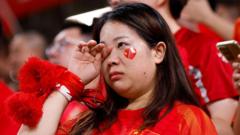This collapse follows years of lofty ambitions sparked by President Xi Jinping, who outlined his hopes for the nation's football future when he took power in 2012. His vision included qualifying for the World Cup, hosting it, and ultimately winning it - a dream that appears increasingly fanciful as recent events unfold. During a casual discussion with Thailand's prime minister, even Xi confided that luck had played a role in a recent victory, reflecting a growing skepticism about the state of the sport.
The disorder stems deep within China's communist structure, where the Chinese Football Association (CFA) lacks the autonomy crucial for grassroots development. Instead, decisions stem from the top, stifling the true potential of the sport. Current governance intertwines football with the Communist Party, disrupting the necessary grassroots participation that fuels competitive success. While the top of the football pyramid consists of a handful of elite clubs, participation at lower levels is severely lacking, leaving a shallow talent pool from which to draw world-class players.
Despite solid following for the women's team, ranked 17th globally, the men's failures are disheartening and embarrassing for fans. Attendance in the men's Super League may be high, but it has not translated into success on the international stage. The once-thriving league has also faced collapse, with over 40 clubs shuttered following economic downturns exacerbated by the pandemic, leading to disinvestment from both state and private entities.
Worse yet, a wave of corruption has marred the sport, with former national team coach Li Tie admitting to match-fixing and bribery, part of an extensive corruption scandal unveiled through state-sponsored media. This wave of scrutiny has exposed the failures of governance within the sport, as executives confess to graft that has plagued Chinese football for years.
Public sentiment remains conflicted, with fans expressing disappointment but also humor in the face of ongoing failures. They have witnessed years of potential squandered under the weight of political control and mismanagement, with the broader sports landscape thriving while football stagnates. Realizing that improvement requires more than just political will, observers recognize that football's roots must be nurtured on the ground level, rather than dictated from above. As Chinese fans reflect on the tragic trajectory of their national team, frustrations mount, with many concluding that football's salvation demands a dramatic departure from political meddling.
The disorder stems deep within China's communist structure, where the Chinese Football Association (CFA) lacks the autonomy crucial for grassroots development. Instead, decisions stem from the top, stifling the true potential of the sport. Current governance intertwines football with the Communist Party, disrupting the necessary grassroots participation that fuels competitive success. While the top of the football pyramid consists of a handful of elite clubs, participation at lower levels is severely lacking, leaving a shallow talent pool from which to draw world-class players.
Despite solid following for the women's team, ranked 17th globally, the men's failures are disheartening and embarrassing for fans. Attendance in the men's Super League may be high, but it has not translated into success on the international stage. The once-thriving league has also faced collapse, with over 40 clubs shuttered following economic downturns exacerbated by the pandemic, leading to disinvestment from both state and private entities.
Worse yet, a wave of corruption has marred the sport, with former national team coach Li Tie admitting to match-fixing and bribery, part of an extensive corruption scandal unveiled through state-sponsored media. This wave of scrutiny has exposed the failures of governance within the sport, as executives confess to graft that has plagued Chinese football for years.
Public sentiment remains conflicted, with fans expressing disappointment but also humor in the face of ongoing failures. They have witnessed years of potential squandered under the weight of political control and mismanagement, with the broader sports landscape thriving while football stagnates. Realizing that improvement requires more than just political will, observers recognize that football's roots must be nurtured on the ground level, rather than dictated from above. As Chinese fans reflect on the tragic trajectory of their national team, frustrations mount, with many concluding that football's salvation demands a dramatic departure from political meddling.





















